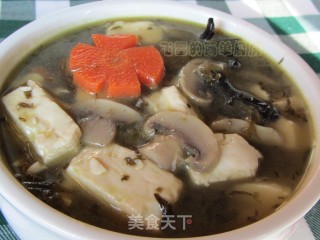Mushroom and Tofu Soup
1.
Lactone tofu, one box
2.
Mushrooms, used five or six
3.
Poured dishes, a small bag
4.
Cut the lactone tofu into the upper grid with a knife
5.
Sliced mushrooms
6.
Pour the dishes and rinse
7.
Cut all the black fungus after the water has been heated
8.
Cut the carrot into a few small flowers for later use
9.
Cut the remaining carrots into small cubes
10.
Hot oil in a pot about one spoon
11.
Put the carrot florets first
12.
Add diced carrots and stir fry
13.
Add mushrooms and stir fry
14.
After pouring the tofu, add a teaspoon of salt, add some water and a few small flowers, cover with the lid, and cook for 3-4 minutes on high heat.
15.
Put it out of the pot and put it in a bowl


Tips:
The legend about Daodu cuisine:
One is related to Fangla's troops. In the past, local people used nine mustard mustard pickles, and most of them would be rotten in the altar. Only part of the altar bottom can be eaten, which is a huge waste. One night, a veteran of Fangla's army accidentally knocked over a jar of pickles, and he stumbled up and lifted the jar up. Two months later, a strange thing happened. Not only did the inverted dish not rot, but it also tasted more delicious. Soon, the method of turning the jar upside down to make pickled vegetables spread, and the pickled vegetables are also called "pour over vegetables."
The second is related to Wu Guotai, the mother of Sun Quan. At the end of the Eastern Han Dynasty, people in Muzhou (now Jiande) had the custom of pickling nine mustards in large earthenware jars as their daily dishes. Sun Quan's mother, Wu Guotai, is a native of Muzhou, and she also pickled nine mustards by herself. Although she is not as strong as a man, the method is more ingenious than ordinary people. In order to put more vegetables in the jar, she uses a round stick to force the cut vegetables in, firmly tightening a large jar. In order to prevent the taste of the vegetables from changing in the process of pickling, she put the jars of pickled vegetables upside down, so that the waste liquid from the pickling process was drained naturally, so that the pickled vegetables in her house would not change their taste. This method is vividly referred to by the people of Meicheng as "reversed".